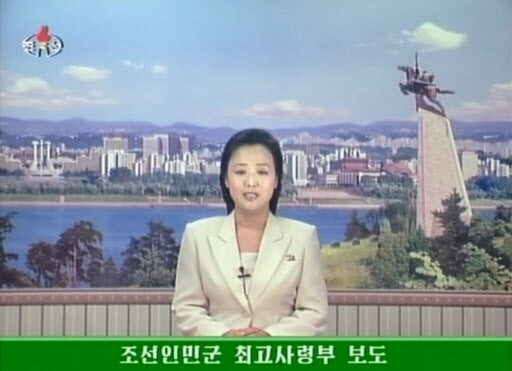hankyoreh
Links to other country sites 다른 나라 사이트 링크
Experts caution West Sea naval “clashes” could warrant international intervention

Tuesday’s naval clash in the West Sea near Daecheong island did not escalate, but experts have warned that clashes in the waters near the Northern Limit Line (NLL) could at any time turn into an international conflict.
Experts explained that if a naval battle were to grow larger than expected, the U.S. military might feel compelled to intervene. Article 3 of the Mutual Defense Treaty signed by South Korea and the U.S. in 1953 reads, “Each party recognizes that an armed attack in the Pacific area upon either of the parties in territories now under their respective administrative control, or hereafter recognized by one of the parties as lawfully brought under the administrative control of the other, would be dangerous to its own peace and safety and declares that it would act to meet the common danger in accordance with its constitutional processes.” There is no specific reference to “automatic intervention,” but experts say that an “act to meet the common danger in accordance with its constitutional processes” means U.S. military intervention.
It was due to these concerns that the Kim Dae-jung government defined the first and second West Sea naval clashes of 1999 and 2002 as “accidental armed clashes” rather than “battles.” A former high-ranking official who attended the meeting of security-related ministers during the 2002 clash said Thursday that if the government calls the clash an intentional North Korean provocation or a “battle,” the U.S. military could intervene and it could become an international conflict. The former official added that because the U.S. also does not wish to intervene it has agreed with our judgment that it was an “accidental clash.”
Experts criticize that, viewed in this context, it is possible to see just how dangerous measures taken since the start of the Lee Myung-bak administration to strengthen the free hand of commanders on the ground have become. The feeling on the ground is to respond as aggressively as possible to achieve “victory,” so giving a free hand to commanders opens the way to escalation. In a worst-case scenario, one cannot exclude a possible situation that would involve an accidental clash and growing battle, followed by U.S. military intervention.
Experts also point out that armed clashes in the West Sea are also intimately tied to Chinese interests. According to them, if an armed clash in the West Sea grows, traffic to and from major Chinese ports such as Shanghai and Tianjin could be paralyzed. Chinese imports of raw materials from Europe and the U.S. and exports of completed goods largely depend on maritime traffic. As a result, the Chinese government also reportedly put out feelers during this latest West Sea clash. Lee Hee-ok, a professor of Sungkyunkwan University and expert on China, said although the automatic military intervention article of the Sino-North Korea Treaty of Friendship is now almost a dead letter, China cannot help but negatively view increasing tensions in the West Sea.
Please direct questions or comments to [englishhani@hani.co.kr]
Editorial・opinion
![[Editorial] Does Yoon think the Korean public is wrong? [Editorial] Does Yoon think the Korean public is wrong?](https://flexible.img.hani.co.kr/flexible/normal/500/300/imgdb/original/2024/0417/8517133419684774.jpg) [Editorial] Does Yoon think the Korean public is wrong?
[Editorial] Does Yoon think the Korean public is wrong?![[Editorial] As it bolsters its alliance with US, Japan must be accountable for past [Editorial] As it bolsters its alliance with US, Japan must be accountable for past](https://flexible.img.hani.co.kr/flexible/normal/500/300/imgdb/original/2024/0417/6817133413968321.jpg) [Editorial] As it bolsters its alliance with US, Japan must be accountable for past
[Editorial] As it bolsters its alliance with US, Japan must be accountable for past- [Guest essay] Amending the Constitution is Yoon’s key to leaving office in public’s good graces
- [Editorial] 10 years on, lessons of Sewol tragedy must never be forgotten
- [Column] A death blow to Korea’s prosecutor politics
- [Correspondent’s column] The US and the end of Japanese pacifism
- [Guest essay] How Korea turned its trainee doctors into monsters
- [Guest essay] As someone who helped forge Seoul-Moscow ties, their status today troubles me
- [Editorial] Koreans sent a loud and clear message to Yoon
- [Column] In Korea’s midterm elections, it’s time for accountability
Most viewed articles
- 1[Column] The clock is ticking for Korea’s first lady
- 2Samsung barricades office as unionized workers strike for better conditions
- 3[Editorial] When the choice is kids or career, Korea will never overcome birth rate woes
- 4Why Israel isn’t hitting Iran with immediate retaliation
- 5[News analysis] After elections, prosecutorial reform will likely make legislative agenda
- 6[Editorial] Does Yoon think the Korean public is wrong?
- 7S. Korea, Japan reaffirm commitment to strengthening trilateral ties with US
- 8[Editorial] As it bolsters its alliance with US, Japan must be accountable for past
- 9Japan officially says compensation of Korean forced laborers isn’t its responsibility
- 10Faith in the power of memory: Why these teens carry yellow ribbons for Sewol